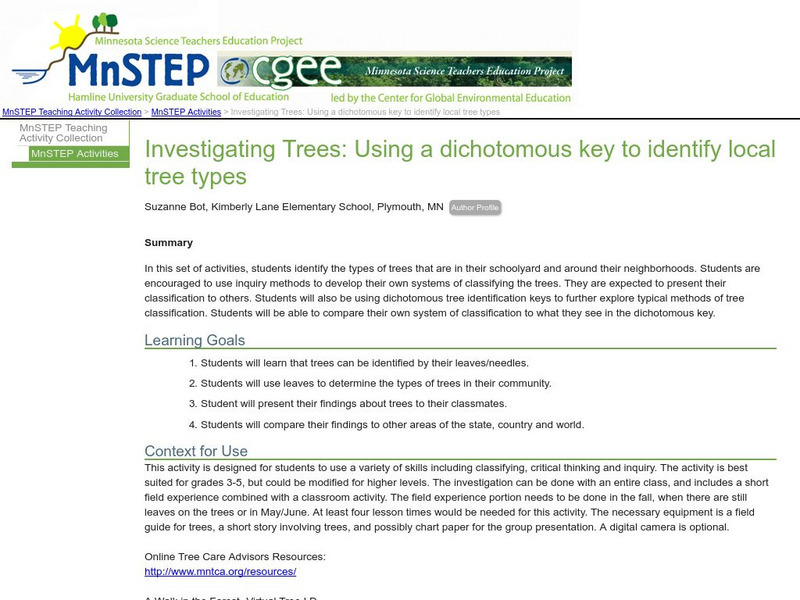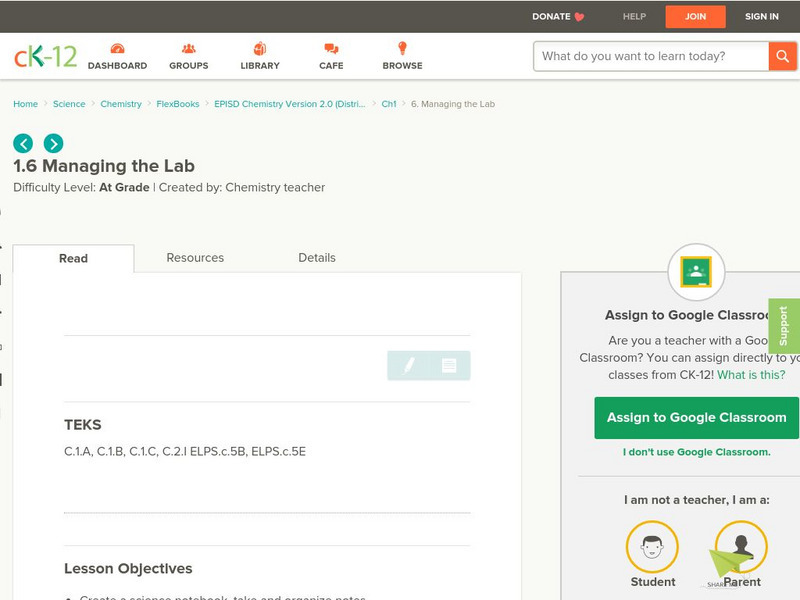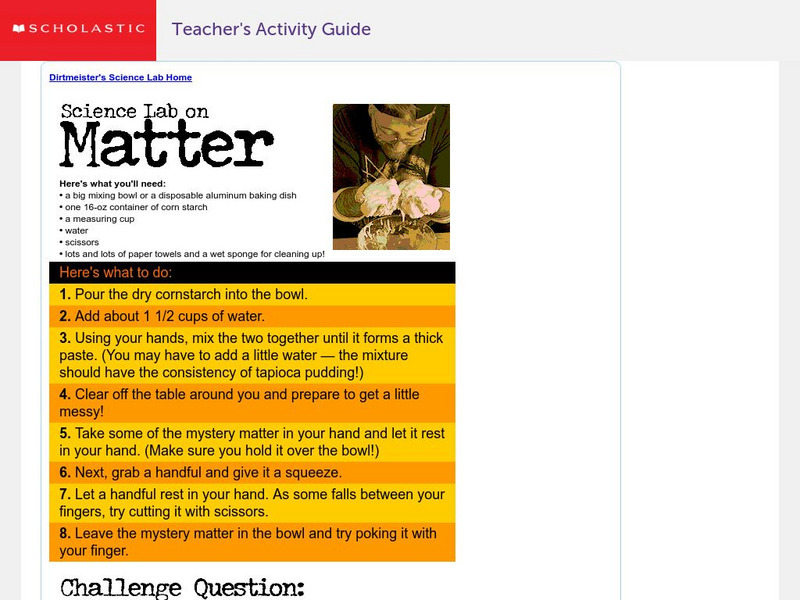Hi, what do you want to do?
Curated OER
Cladistics Is a Zip...Baggie
Students explore how the grouping of organisms based on their shared derived characters forms the basis of a cladogram.
Curated OER
Petrology in the Gravel Pit
Students are introduced to a wide range of rock types when they examine pebbles and boulders exposed in a gravel pit. Students practice rock description and identification and categorize the rocks sedimentary, igneous, or metamorphic.
Curated OER
Names in the Field: A Simple GPS Field Exercise
Students explore basic methods of GPS data collection, uploading the data to a computer, and making simple maps of their data using GIS software. They create a map of the data using GIS software (or Excel)
Curated OER
Fish and Oxygen
Students explore what factors affect population dynamics, identify factors affecting fish populations, and use Stella to model how dissolved oxygen affects fish populations.
Curated OER
Palm use in Astronomy
Young scholars identify and recall common constellations by using a palm pilot with astronomy software. Students will use their Palm to assist them in correctly identifying constellations using a telescope.
Curated OER
Into the Pond
Seventh graders use a pond to explore macroinvertebrates and other organisms. They use a dichotomous key to classify the organisms and maintain a journal recording their findings.
Curated OER
Floodplains in the field (with GIS)
Students measure a topographic and geologic cross-section across a floodplain by simple surveying and auguring techniques. They consider the spatial context of the field observations, use GPS measurements, and desktop GIS analyses.
Curated OER
Earthworms
Fifth graders research the earthworm and write a one paragraph report on its anatomy and habitat. They learn about worms and how to dissect them through Video Streaming and virtual dissections, along with actually dissect a worm as...
Curated OER
Territorial Behavior in Dragonflies and Damselflies
Young scholars explore dragonfiles/damselfiles and their behaviors. They examine their differences and their life cycles. Students observe the dragonflies in a field and determine the number of different species.
Curated OER
Groundwater Pump Test
Students observe groundwater flowing to a pump, changes in groundwater table as a result of pumping, and the quantity and quality of water in the groundwater system. Students must graph and interpret their data, and quantify orders of...
Curated OER
Annotating Change in Satellite Images
Students compare a series of satellite images taken 3-4 years apart to investigate the effects of human land use. They annotate the images using ImageJ software and use the annotated images to explain their findings.
Curated OER
Watershed Analysis
Students conduct a regional watershed analysis of an area of their choosing. Using on-line data and their personal knowledge of the area, they determine the annual hydrologic budget and teach the class about "their" watershed.
Curated OER
Looking into Earth with GIS
Students work with data from a seismic wave model in a freely available GIS (geographic information system) program, ArcVoyager SE. Using a GIS, they examine maps and produce graphs to explore variations in seismic wave velocities at...
My Science Site
Middle School Science: Shoe Classification Lab [Pdf]
This concise worksheet site will enable students to learn how to create a classification system and to understand the reasons for classification in science. Requires Adobe Reader.
Miami University
Miami University: Nuts and Bolts of Classification
Discusses many aspects of taxonomy. Provides a lab activity where students are required to devise a classification scheme for nuts, bolts, and other hardware items.
Science Education Resource Center at Carleton College
Serc: Leaf Investigation and Classification
Students will learn about classification of leaves by collecting a variety of leaves from home and working in small groups in the classroom to sort them into groups. Students will present their criteria for grouping the leaves to the class.
Alabama Learning Exchange
Alex: Taxonomy: The Importance of Classifying
This is a technology-based, hands-on Biology lesson used to introduce the topic of Taxonomy and the importance of classifying. Students will listen to a podcast about classifying every living thing on Earth. Students will then give some...
Science Education Resource Center at Carleton College
Serc: Irregular Shaped Object Lab Test
Students will determine what an unknown substance is by finding mass, volume, displacement, and density of an object. Students will also create a report which will require them to read a graph, interpret data, calculate averages, and...
Science Education Resource Center at Carleton College
Serc: Investigating Trees: Using a Dichotomous Key to Identify Local Tree Types
Using their own classification methods learners will identify the types of trees found around their school and neighborhoods. Students will then present their classification methods to the class. Later learners will use dichotomous tree...
CK-12 Foundation
Ck 12: Safety
[Free Registration/Login may be required to access all resource tools.] In the following online tutorial students will explore safety practices and rules and symbols associated with them. They will define components of the NFPA Label and...
Science Education Resource Center at Carleton College
Serc: Rock Types Lab
A well-designed lesson on rocks where students first learn about how the three categories of rocks form (sedimentary, igneous, and metamorphic), then must examine the features of different rock samples, and determine which category each...
Cornell Lab of Ornithology
Cornell Lab of Ornithology: All About Birds
One of the great attractions of this site is the ability to listen to the birds. Each bird is categorized with a picture, description, its cry, conservation status and "Cool Facts." There are tips for attracting birds as well as...
Scholastic
Scholastic: Dirtmeister's Science Lab: Matter
Students will use water and cornstarch to make a mystery matter, and then discuss what happens when different energy is applied.
Science Education Resource Center at Carleton College
Serc: Arthropod Diversity and Evolution an After School Program
This website provides information required for a hands-on program that enables students to work alongside active museum curators, postdoctoral researchers, and collection managers. The programs will teach students to identify, classify,...


















![Middle School Science: Shoe Classification Lab [Pdf] Activity Middle School Science: Shoe Classification Lab [Pdf] Activity](https://static.lp.lexp.cloud/images/attachment_defaults/resource/large/FPO-knovation.png)








